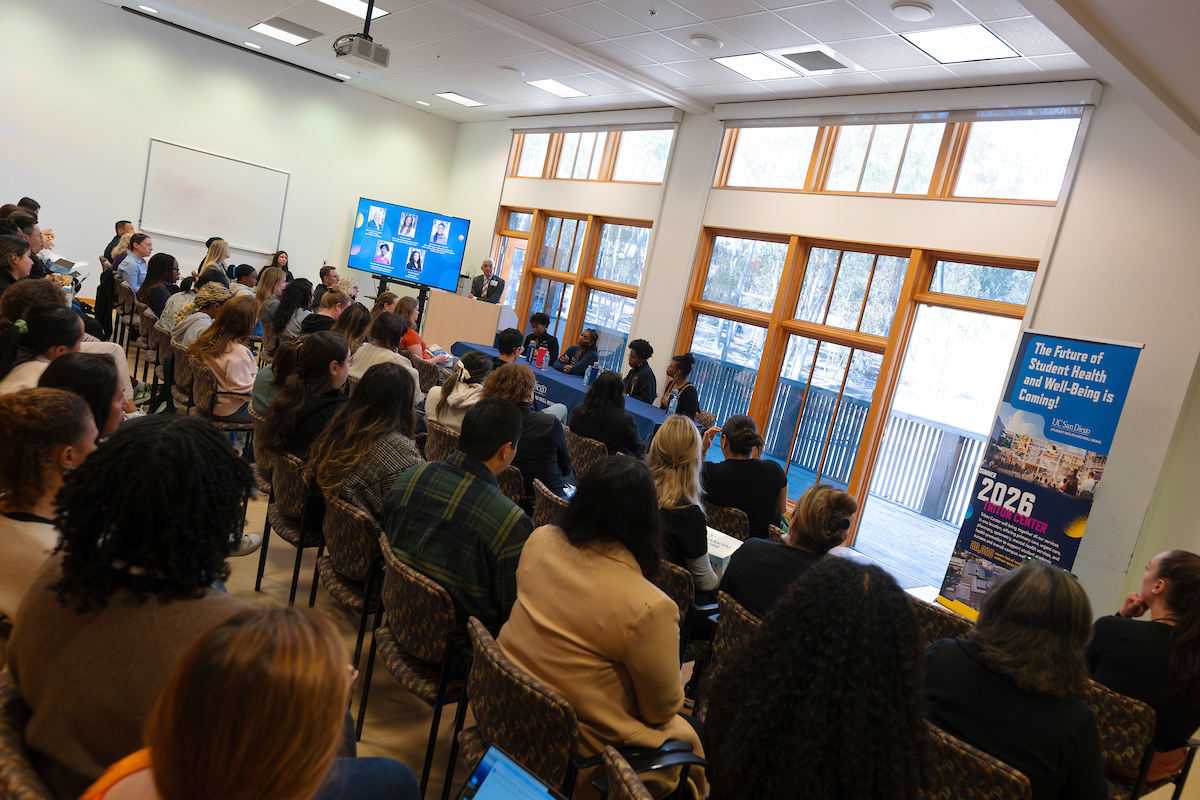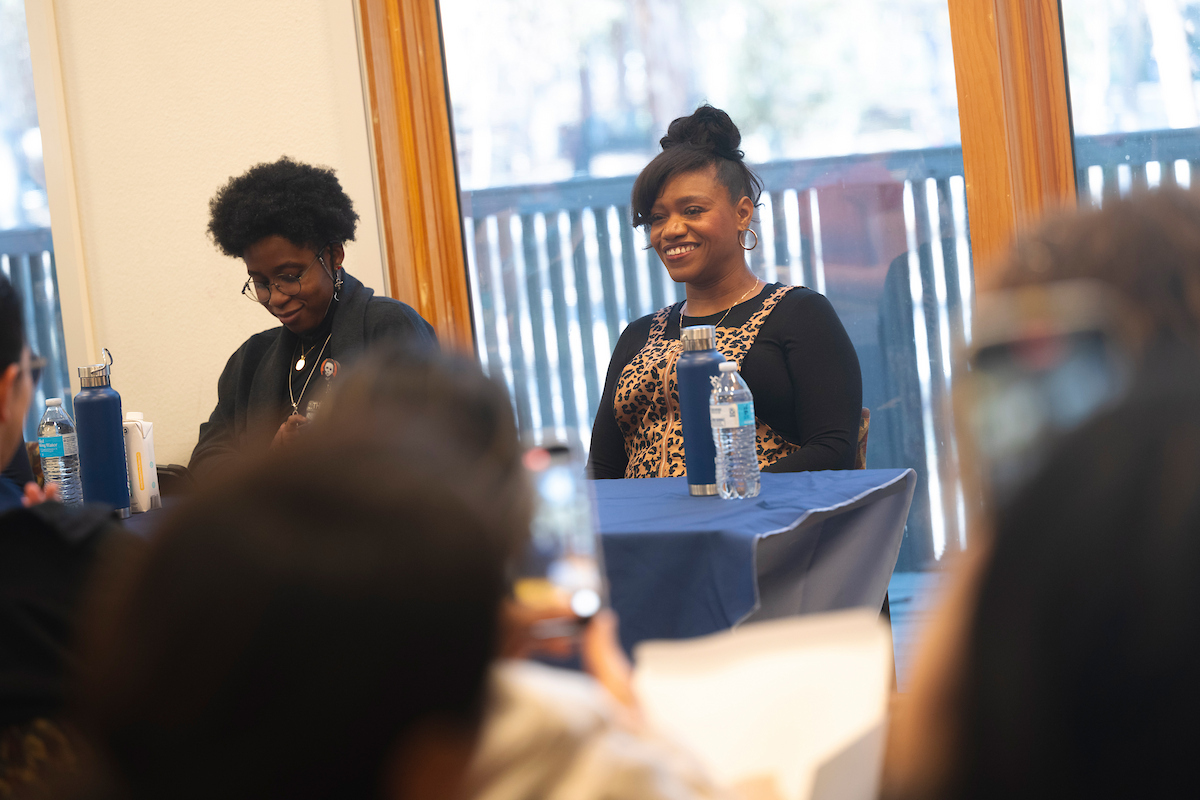Inspiring the Next Generation of Diverse Leaders
Story by:
Published Date
Article Content
Drawing on their personal experiences as Black health care professionals, members of UC San Diego’s Student Health and Well-Being cluster offered insight into the unique challenges they’ve faced, the resilience needed to work in the field and the importance of inclusion in health care at a panel, “Black Professionals in Health Care: Inspiring the Next Generation of Diverse Leaders.”
In the United States, Black people account for 13.6% of the population yet only 5.7% of physicians and 2% of psychiatrists are Black. The panel, co-sponsored by UC San Diego Student Health and Well-Being and Career Services Center, addressed this with four Student Health Services professionals: Kelley Adams, director of quality, risk management and patient safety at Counseling and Psychological Services; Cristal Muhammad, principal radiologic technologist and safety coordinator for Student Health Services; Tay Richardson, a gender affirming care coordinator within the Student Health and Well-Being cluster; and Ashley Valdez Valdez, a clinical nurse at Student Health Services.
Moderated by UC San Diego’s Executive Director of Student Health and Well-Being Edward P. Junkins, MD, event attendees learned about the drive and determination it takes to be a health care professional.

How have you navigated the challenges of being a Black healthcare provider in your industry?>
Kelley Adams (KA): I’ve experienced challenges all along the way. How I navigate them depends on where I am personally when the challenge arises.
Tay Richardson (TR): I agree; how I address obstacles depends on my energy. Being on and aware constantly is tiring and sometimes my energy is low.
Edward Junkins (EJ): The challenge doesn't stop when the conversation stops. We planned this conversation to help each other and our patients, and we need to remember that just asking a question of our patients may trigger something in them.
What are the most significant obstacles Black professionals face in achieving career advancement, and how have you overcome them?
Ashley Valdez (AV): Inclusion and having people in spaces that can help bring others. As Black people, we need more people that look like us in spaces to do that.
TR: There can be a feeling of needing to go above and beyond just to meet expectations as a Black professional. I constantly am hyper-aware of how I am being perceived in space: my body language, how and what I’m saying. That takes a lot of energy.
Who are the Black leaders who have most inspired you, and what lessons have you learned from them?
EJ: I didn't have many Black mentors and the ones I did have were giants who didn’t have anyone else’s shoulders to stand on. They told me I wouldn't be given a free pass or another chance.
KA: I didn't have a lot of mentors who were Black physicians because I didn’t work with any Black physicians until the training director at my residency program. I had people along the way who’d provide mentorship but there were not a lot of people who looked like me.
AV: My mentors in healthcare didn't look like me but I grew up surrounded by influential Black business people in San Diego.
TR: My mentor worked in residential life. She was so authentically herself in and out of that role and it was amazing to see a Black woman showing up in her day to day. My mom is a nurse and seeing the work she put in constantly has been a driving force for me.
EJ: Representation matters. The percentage of Black male physicians is worse than what it was 50 years ago. Something is happening along the way. Who is there to advocate for everybody? It starts early and it has to be addressed at every level.
What advice would you give to young Black professionals aspiring to leadership roles?
Cristal Muhammad (CM): Whatever you’re doing, go beyond and excel. Document everything you're doing so that when a position opens up, you’re ready.
AV: You never know who’s watching you or when an opportunity will open. Make sure you’re moving like you're already in that space because someone may be looking at you to put you there.
>KA: Take leadership classes and get exposed to how one becomes and succeeds at being a leader. I don't think young Black people are pushed into doing this as much. If you see someone in a leadership role but they aren’t in your field, their leadership attributes can apply. Find a mentor who matches the type of leader you want to be.
TR: Don't be afraid to make connections on and off campus. Look to people outside of your bubble. Find people you are aspiring to pull some traits from. If someone has traits you aspire to have, that’s probably someone you want to connect with.
EJ: For people aspiring to be leaders, believe you belong in that room already for no other reason than you have the skills. Representation matters.

Share This:
Stay in the Know
Keep up with all the latest from UC San Diego. Subscribe to the newsletter today.




